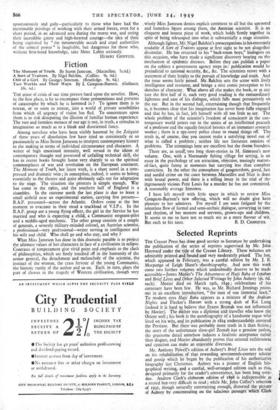Fiction
The Moment of Truth. By Storm Jameson. (Macmillan. 7s.6d.) A Sort of Traitors. By Nigel Balchin. (Collins. 9s. 6d.) Chit of a Girl. By Georges Simenon. (Routledge. 9s. 6d.)
Two Worlds and Their Ways. By I. Compton-Burnett. (Gollancz.
10s. 6d.) •
THE sense of crisis of our time presses hard upon the novelist. How, in the first place, is he to encompass those premonitions and portents of catastrophe by which he is hemmed in ? To ignore them is to retreat, or to seem to retreat, into a world of private sensibilities from which all urgency of vision has fled. To concentrate upon them is to risk dissipating the illusion of familiar human experience. The vast and formless menace of our age is not, in truth, a stimulus to imagination so much as to a bleak and disoriented fancy.
Among novelists who have been visibly haunted by the Zeitgeist of these years of dissolution few have tried so consistently or so passionately as Miss Storm Jameson to interpret contemporary history in the making in terms of individual circumstance and character. A writer of high emotional intensity, well versed in the idiom of contemporary thought and possessed of unfailing technical skill, she has in recent books brought home very sharply to us the spiritual commonplaces of war and revolution on the European continent. The Moment of Truth, her latest work, is a short novel in a com- pressed and dramatic vein ; in conception, indeed, it seems to belong essentially to the theatre and quite obviously calls out for adaptation to the stage. The situation she presents is simple enough. War has come in the 196os, and the southern half of England is a shambles. In the extreme north the last plane is due to leave a small airfield near an experimental station, carrying five persons- R.A.F. personnel—across the Atlantic. Orders come at the last moment to evacuate in their stead a truckload of V.I.P.s. In the R.A.F. group are a young flying officer, the girl in the Service he has married and who is expecting a child, a Communist sergeant-pilot and a middle-aged mechanic. The other group consists of a couple of generals, a severely Military-minded colonel, an Austrian scientist, a professional—very professional—writer serving in intelligence and his wife and child. Who shall go and who stay, and why ?
. What Miss Jameson has done in this dramatic parable is to project the ultimate values of her characters in face of a civilisation in eclipse. Contrasts of temperament give vivid point and emphasis to the clash of philosophies, which are finely touched off in the humanity of the senior general, the detachment and melancholy of the scientist, the instinct of the woman the crass fervour of the young Communist, the hieratic vanity of the author and so on. Each. in turn, plays the part of chorus in the tragedy of Western civilisation, though very ,wisely Miss Jameson denies explicit continent to all but the uprooted and homeless figure among them, the Austrian scientist. It is an eloquent and honest piece of work, which holds firmly together in spite of being telescoped into what is substantially a stage situation.
Although lighter, Mr. Nigel Balchin's preoccupations in his extremely readable A Sort of Traitors appear at first sight to be not altogether dissimilar. He has returned to his " back-room boys," biologists on this occasion, who have made a significant discovery bearing on the mechanism of epidemic diseases. Before they can.publish a paper on the subject a government agency steps in: publication would be prejudicial to national security, &c., &c. The scientists retort with a statement of their loyalty to the pursuit of knowledge and truth. And the issue seems fairly joined. Mr. Balchin sets the scene with lively intelligence and resource, and brings a nice comic perception to his sketches of character. What above all else makes the book, or at any rate the first half of it, such very good reading is the extraordinary lightness and, ease of his dialogue, which falls most persuasively on the ear. But in the second half, entertaining though that frequently is, it becomes clear that his imagination has never been fully engaged and that he has, in fact, left himself with all too little to say. The whole problem of the scientist's freedom of conscience in the con- temporary world peters out in the antics of an intellectual peacock of a professor and the equally farcical heroics of an immature research worker ; there is a spy-story police chase to round things off. The truth is, of course, that you cannot make a satisfying hovel out of what is called a problem ; neither life nor literature consists of problems. The trimmings here are excellent but the theme founders.
There are, as usual -two two long short-stories in M. Siinenon's new volume. One, with a Normandy fishing village for setting, is an essay in the psychology of sex attraction, objective, teasingly matter- of-fact, quite funny at moments but carrying less than complete conviction. In the other the atmosphere of gangsterdom, greed, lust and sordid crime on the coast between Marseilles and Nice is done with brutal power, and there is a telling irony in the trial of 'the ingenuously vicious Petit Louis for a murder he has not committed. A reasonably average Simenon.
I have left myself- with little space in which to review Miss Compton-Burnett's new offering, which will no doubt give keen pleasure to her admirers. For myself I am soon fatigued by the relentless flow of formal and semi-archaic dialogue, unvarying in tone and rhythm, of her masters and servants, grown-ups and children. It seems to me to have not so much wit as a mere flavour of wit:


































 Previous page
Previous page